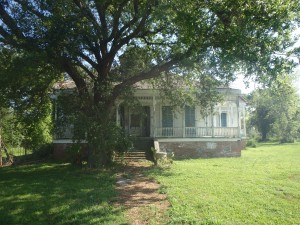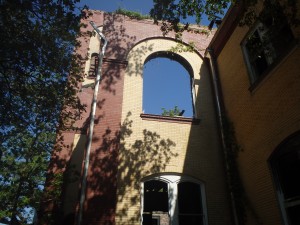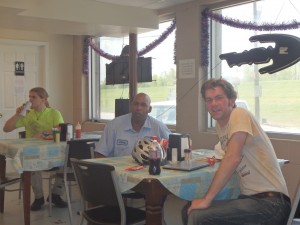 I landed on the eastbank and immediately the place was different. It was quiet here – no highway, and indeed, no people. There was a structure, right across from the ferry landing, which was actually old – somehow or other an old wooden house had survived the hurricanes. It was abandoned, mind you, but it was still there. It was the finest piece of architecture I had seen so far.
I landed on the eastbank and immediately the place was different. It was quiet here – no highway, and indeed, no people. There was a structure, right across from the ferry landing, which was actually old – somehow or other an old wooden house had survived the hurricanes. It was abandoned, mind you, but it was still there. It was the finest piece of architecture I had seen so far.
Across the street from it was a brick shell of a building which had been the courthouse. It had been operating recently – it had modern additions tacked onto it, and war memorials along its front of fresh granite, and the kind of signs that indicate a twenty-first century government building:
NOTICE
ALL PACKAGES, BRIEFCASES, AND CONTAINERS
SUBJECT TO SEARCH PRIOR TO ENTERING BUILDING.
But it was just a shell, forty-foot-tall brick walls standing roofless under the blue sky. Charred timbers filled the enceinte of its walls. I was left to speculate if it had been flooded by the hurricane, and an electrical fire commenced, or was flooded and then set on fire by someone later, or something else. It was a striking enough ruin, with red brick arches through which the blue sky shone. It had become a kind of massive hive for large bees, resembling bumblebees. I don’t know if they were swarming particularly on this April day or if they are present in such numbers that they are always flying about, but it appeared that this entire hundred foot-long structure was their hive. They quite effectively deterred me from trying to explore within.
There was no one around. I ate my lunch under the tree in front of the courthouse ruin, and then walked around to the back, where I saw a post office in a trailer in the parking lot. Figuring whoever was working at the post office would know some things about Pointe a la Hache – and would also have time, given the complete desolation here – I walked over. As I came to the wooden ramp leading up to the door of the trailer, a woman in a post office uniform emerged with a can of wasp killer. She shook the can and looked up above the door.
“My God,” she said. “They just did that! That just happened! I can’t believe that!” She then took aim at a bee and shot some kind of foamy stuff at it. It buzzed around her, apparently unafraid, and she shot again and then swatted at it. It flew off. In her swatting she caught sight of me.
“It just put another hole in the wood!” she said. “Right now! In the last hour!” She pointed to a clearly visible dime-sized hole in the wood.
“What are they?”
“Wood bees,” she said. “They chew into the wood, they’re everywhere.”
“The old courthouse there seems to be their hive,” I said.
“Yeah… well they come from that tree over there,” she said, pointing to a bald cypress standing in what appeared to be the swamp, which began at the edge of the parking lot. She had a southern accent, but it was very slight. I could just barely pick up a slight lingering over her vowels. She had dark hair streaked with gray, and she looked fit and active and intelligent.
“How long has that courthouse been abandoned?”
“Oh… it burned down just before the storm. Then there was the storm, and… I don’t know. They say they’re going to fix it again, put the courthouse back on this side of the river. I don’t know what will happen. You can see a lot of things got destroyed.” Indeed, we were standing in a weed-filled parking lot behind a ruined building, which was across the street from an abandoned house. The only thing functioning was the small trailer where she worked alone, waging a bardless war against a swamp full of wood bees.
“How much water was here?”
“Oh I don’t know. Probably over the levee. I was in Buras we had twenty-three feet there.” She paused. “It’s come back a little but… but not really. It’s mostly just trailers and mobile homes… when I was growing up we had a lot, we had hotels, all kinds of restaurants, we had stuff to do… we had three movie thee-ay-ters” – that word jumped out from her generally standard English – “we had one in Venice, one in Buras, one in Empire… now the kids today they don’t have anything to do… there’s the Whah” [the Y] “that’s got a swimmin’ poo but that’s about it.”
I spent about ten minutes later in the day while biking saying to myself over and over, “Swimmin’ poo,” and it did not get old to me.
“They say it’s gonna come back… I don’t know. You know my uncle he wrote an article I was looking at it… he wrote it in 1965, see we had Betsy in ’65 that was fifty years ago, before Katrina. He wrote the article just begging them to rebuild the coastline. Now they say they’re gonna do that but they shoulda done this fifty years ago. The bayous are all different we used to have mangroves and trees… all that’s gone. The whole land here has changed, you can tell.”
She said she was a few years from retirement, and then she’d “see.” It seemed she might have other places in mind to go. She seemed thoughtful and considerate, the kind of person who would spend her retirement going to wildlife refuges and looking at birds, thinking whatever quiet beautiful thoughtful thoughts those people think.
We parted warmly and I walked back over to my bike, determined to head north. But after a few hundred feet I came to a store. My guidebook had informed me that this would be the last place I could get food or water today – the next store of any sort was on the other side of the campground I would be staying at, which was at the outskirts of New Orleans. So I decided to stop and hydrate. As I walked in I looked at the signs posted in the entryway, and one in particular charmed me:
It’s Summer Time If
You Are Looking to
Cool Off Call????
D-Money Waterslide
Contact: Desmond
(Tunafish) Simeon
Needless to say, I am always made happier by remembering that somewhere out there there is a person called Desmond “Tunafish” Simeon; even more so by knowing that I am near him, and can touch a piece of paper that ran through his printer.
Inside I admired the cashier, a thirtyish black woman who said things like, “You nee a bag chile?” She and a customer kept laughing and joking so much I just had to say, “I’m not from around here I’m from New York, and I just wanted to say what a pleasure it is listening to you two laugh and joke and talk. People around here HAVE FUN, and I think it’s beautiful.”
They broke into wide smiles. “WHAT? It’s not like that in New York??”
“No, in New York everybody works all the time.”
“Yeah,” he said: “it’s like they tense!”
She said, “You know, I’ve been to New York! One time. Yeah. You’re so right! Everyone there was like robots. Fast robots, but robots.”
He agreed. “You know I lived for a year in Huxtable Georgia you know every day I saw this woman she just waved at me, never came by to say hello or nothin. Never talked. Just waved – what the hell is that? Man, I’m not like that. I got to know you. I got to know you. We different here.”
I thanked them and took a seat with my drink. I downloaded the photos from my camera onto my computer, and discovered there was internet access there as well. So I got online and started sending emails, when I looked up and saw a muscular black man sitting down at my table with me. “Hey how y’all doin,” he said. “Where you from? I’m Zachary.” And after shaking my hand he started eating his lunch right there across from me. I couldn’t believe this. You didn’t need to be terribly extrovert to meet people in Louisiana: all you had to do was sit someplace and conversations would happen. He worked maintaining the levees, mostly mowing the grass; the levees are mowed in order to prevent trees from growing on them; trees, while binding the levees together while alive, rip out chunks of the levees when they fall, and ultimately weaken them. We discussed the animals found around here. He inquired very particularly about the deer in New York, and he sounded jealous when I told him how many we had.
“You got coyotes theh?” It seemed to be a point of special curiosity for him, as if he had been waiting for the opportunity to ask someone from New York about coyotes.
“Lots. I hear them all the time at my cabin.”
“They a new problem here… we never had ‘em before.”
“Well, they’re not a problem. Something’s got to eat the rabbits, right? You said there are lots of rabbits here.”
“Well that’s the problem I want to eat the rabbits, so I don’t want no coyotes! We catch the rabbits all the time.”
“You catch stuff, huh? Is there any fur business around here anymore? I hear that used to be a major industry around here.”
“Yeah, that used to be… no mo. They used to catch muskrat. Now they got that nutra-rat.”
“Yeah I’ve heard about them, don’t the coyotes eat those?”
“Oh no, the coyotes run from them, they get fifty pounds! Imagine a fifty-pound rat? That’s a nutrarat.”
The nutria, an introduced species, has caused problems by eating local vegetation so thoroughly that it compromises the physical structure of the swamp. There was a government program encouraging hunters to kill them.
“The nutrarats, you get fi dollahs a tail if you bring ‘em in.”
I got one of the other diners to take a picture of me and Zachary. I felt hydrated and ready to strike north.


One Comment